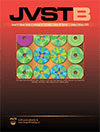
JOURNAL OF VACUUM SCIENCE & TECHNOLOGY B
metrics 2024
Advancing the Frontiers of Vacuum Science and Technology
Introduction
JOURNAL OF VACUUM SCIENCE & TECHNOLOGY B, published by the AIP Publishing, serves as a vital platform for the dissemination of research in the field of vacuum science and technology. With an ISSN of 2166-2746 and E-ISSN of 2166-2754, this peer-reviewed journal covers a wide array of topics, including condensed matter physics, electrical and electronic engineering, and various materials sciences, underscored by its Q3 quartile rankings across multiple categories in 2023. Although currently operating under a subscription model, the journal is recognized for its robust editorial standards and contribution to advancements in instrumentation and process technology, making it an essential resource for researchers and professionals seeking to stay at the forefront of the field. The journal's comprehensive approach addresses both theoretical and practical aspects of vacuum technology, fostering innovation and collaboration among the academic community. Additionally, the journal spans converged years of research from 1991 to 1992 and 2009 to 2024, reflecting its dynamic evolution and relevance in addressing contemporary scientific inquiries.
Metrics 2024
 0.33
0.33 1.50
1.50 1.30
1.30 124
124Metrics History
Rank 2024
Scopus
IF (Web Of Science)
JCI (Web Of Science)
Quartile History
Similar Journals
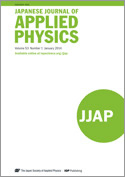
JAPANESE JOURNAL OF APPLIED PHYSICS
Fostering Global Collaboration in Physics ResearchThe Japanese Journal of Applied Physics is a premier publication in the field of applied physics, offering a platform for researchers and professionals to present their findings and innovations. Published by IOP Publishing Ltd, this esteemed journal has been active since 1963 and continues to contribute significantly to the understanding and advancement of applied physics across diverse applications. The journal is recognized for its rigorous peer-review process and high-quality publications, evidenced by its 2023 ranking of Q2 in Engineering (Miscellaneous) and Q3 in Physics and Astronomy (Miscellaneous). With an accessible ISSN of 0021-4922 and E-ISSN 1347-4065, the journal cultivates a global readership, fostering collaboration and innovation within the scientific community. Although the journal does not currently offer open access options, its valuable insights into the latest technological advancements and theoretical developments remain crucial for students, researchers, and industry professionals alike. By bridging the gap between fundamental physics and practical applications, the Japanese Journal of Applied Physics plays a vital role in shaping the future of applied sciences in Japan and beyond.
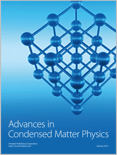
Advances in Condensed Matter Physics
Fostering Collaboration in Cutting-Edge PhysicsAdvances in Condensed Matter Physics is a distinguished journal published by HINDAWI LTD, dedicated to the rapid dissemination of high-quality research in the field of condensed matter physics. Since its inception in 2008, this Open Access journal has facilitated wide accessibility to cutting-edge findings and theoretical advancements, with aims to foster collaboration and innovation within the scientific community. With an ISSN of 1687-8108 and an E-ISSN of 1687-8124, the journal covers an extensive range of topics, from quantum materials to nanotechnology, ensuring relevance and engagement across various sub-disciplines. As a testament to its impact in the field, it is ranked in the Q3 category for 2023 within Scopus and holds a position in the 34th percentile for physics and astronomy. The journal's continuous commitment to publishing significant exploratory research until 2024 makes it a pivotal resource for researchers, professionals, and students eager to stay on the leading edge of condensed matter physics advancements.

Superconductivity
Unlocking the potential of superconductivity for a sustainable future.Superconductivity is a prestigious open-access journal published by Elsevier, dedicated to advancing the field of superconductivity and its applications across various domains. Launched in 2022, this journal has quickly established itself as a pivotal platform for researchers and professionals, earning a distinguished Q1 ranking in multiple categories including Condensed Matter Physics, Electrical and Electronic Engineering, Electronic, Optical and Magnetic Materials, and Energy Engineering and Power Technology. Researchers can access the journal freely, promoting broad dissemination of innovative research findings to a global audience. With a significant focus on multidisciplinary approaches, the journal encourages submissions that explore the theoretical, experimental, and practical aspects of superconductivity. Given its high visibility and the rigorous peer-review process, Superconductivity is an essential resource for those aiming to contribute to the cutting-edge advancements in this transformative field.

PHYSICS OF THE SOLID STATE
Illuminating the Path of Interdisciplinary ResearchPhysics of the Solid State is a distinguished journal published by Pleiades Publishing Inc., focusing on the rapid advancements and fundamental research in the realms of condensed matter physics, electronic, optical, and magnetic materials. With an ISSN of 1063-7834 and an E-ISSN of 1090-6460, this journal serves as a crucial platform for disseminating high-quality research findings, insights, and reviews essential for both academic and industrial professionals in the field. As of 2023, its Scopus ranking places it in the 26th percentile for both Condensed Matter Physics and Electronic, Optical and Magnetic Materials, reflecting its evolving influence and contribution to the scientific community. Although currently classified in the Q4 quartile, the journal aims to foster interdisciplinary dialogue, improve research visibility, and enhance its impact on contemporary scientific challenges through rigorous peer-reviewed articles and focused special issues. Despite its traditional model of access, it continues to play a pivotal role in engaging researchers and fostering innovation in solid-state physics.
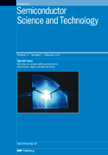
SEMICONDUCTOR SCIENCE AND TECHNOLOGY
Advancing semiconductor innovation through cutting-edge research.Semiconductor Science and Technology is a pivotal journal in the fields of condensed matter physics, electrical and electronic engineering, and materials science, published by IOP Publishing Ltd. With an ISSN of 0268-1242 and an E-ISSN of 1361-6641, this esteemed journal has been disseminating groundbreaking research since 1986 and is set to continue through 2024. Recognized in the latest categorizations, it holds a notable Q2 ranking in Condensed Matter Physics, Electrical and Electronic Engineering, and Materials Chemistry, alongside a Q3 ranking in Electronic, Optical, and Magnetic Materials, highlighting its significant contribution to the advancement of these disciplines. Although it does not operate under an open access model, the journal provides critical access options for researchers and professionals seeking to foster innovation and collaboration within the semiconductor community. As a vital resource, Semiconductor Science and Technology not only supports the dissemination of high-quality research but also serves as a platform for emerging trends and developments that are shaping the future of semiconductor technology.

SEMICONDUCTORS
Fostering breakthroughs in semiconductor technology.SEMICONDUCTORS, published by PLEIADES PUBLISHING INC, is a prominent journal that provides a platform for researchers and professionals in the fields of Atomic and Molecular Physics, Condensed Matter Physics, and Electronic, Optical and Magnetic Materials. With an ISSN of 1063-7826 and an E-ISSN of 1090-6479, the journal has been diligently disseminating knowledge since its inception in 1996 and continues to pave the way for innovative research until 2024. Although currently unclassified in the Open Access model, its influence is underscored by its rankings in Scopus, where it ranks in the 21st-22nd percentile across critical scientific categories. SEMICONDUCTORS serves as an essential resource for cutting-edge research, fostering a greater understanding of semiconductor materials and their applications, thereby assisting the scientific community in pushing the boundaries of technology and innovation.
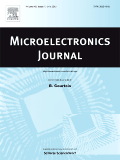
MICROELECTRONICS JOURNAL
Pioneering Discoveries in Microelectronics and BeyondMICROELECTRONICS JOURNAL, published by Elsevier Sci Ltd since 1974, serves as a pivotal platform for disseminating cutting-edge research in the realms of microelectronics, nanotechnology, and materials science. With editions spanning from 1974 to 2024, the journal is well-respected within the scientific community, boasting a strong presence in key categories such as Atomic and Molecular Physics, Condensed Matter Physics, and Electrical and Electronic Engineering, as evidenced by its Q3 ranking in 2023. Researchers and professionals engaged in the exploration of electronic materials, optical applications, and nanoscale innovations can greatly benefit from the journal's insights, which situate their work within a robust academic framework. Although the journal does not currently offer open access, its rigorous peer-review process and high visibility in Scopus rankings—including a percentile ranking of 58th in Condensed Matter Physics—make it an essential resource for anyone looking to stay at the forefront of advancements in microelectronics and related fields.
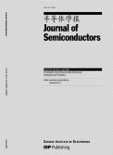
Journal of Semiconductors
Exploring the frontiers of electronic and optical materials.Journal of Semiconductors, published by IOP Publishing Ltd in the United Kingdom, is a leading scholarly journal that has established itself as a premier platform for disseminating high-quality research in the fields of condensed matter physics, electrical and electronic engineering, and materials chemistry. Since its inception in 2009, the journal has featured research articles that delve into the fundamental and applied aspects of semiconductor technologies, making significant contributions to advancements in electronic, optical, and magnetic materials. The journal boasts an impressive Q1 ranking in several categories, including Condensed Matter Physics and Electronic, Optical and Magnetic Materials, reflecting its influential role in shaping contemporary research. With a dedicated audience of researchers, professionals, and students, it aims to foster collaboration and innovation in this dynamic field. Although it operates under a traditional access model, the journal offers various publication options that ensure the visibility and impact of its articles. Through its rigorous peer-review process and commitment to excellence, the Journal of Semiconductors continues to be an invaluable resource for those seeking to stay at the forefront of semiconductor research and technology.

Electronic Materials Letters
Exploring Breakthroughs in Electronic MaterialsElectronic Materials Letters is a distinguished journal dedicated to the dissemination of research in the field of electronic, optical, and magnetic materials. Published by the Korean Institute of Metals and Materials, this journal has established itself as a critical platform for scholars and practitioners since its inception in 2008, with coverage extending through 2024. With an ISSN of 1738-8090 and an E-ISSN of 2093-6788, it has achieved a commendable Q3 categorization for 2023, ranking 107 out of 284 in the Scopus database's specialized field, reflecting its relevance with a 62nd percentile position among its peers. Although this journal operates under a traditional access model, its rigorous peer-review process ensures that only the most impactful research reaches its audience, thereby maintaining high scholarly standards. Positioned in South Korea at the heart of technological innovation, Electronic Materials Letters plays a vital role in bridging the gap between theoretical investigations and practical applications, making it an essential resource for researchers, industry professionals, and students aiming to thrive in the rapidly evolving materials science landscape.

Applied Science and Convergence Technology
Catalyzing Progress in Applied Science and ConvergenceApplied Science and Convergence Technology (ISSN: 2288-6559) is a premier academic journal published by the Korean Vacuum Society, dedicated to advancing knowledge in the intersecting fields of condensed matter physics, electrical and electronic engineering, materials science, and theoretical chemistry. Based in South Korea, this journal serves as an essential platform for researchers, professionals, and students seeking to explore innovative applications and methodologies that drive convergence in science and technology. With a convergence period spanning from 2019 to 2024, the journal aims to publish high-quality original research and review articles that foster collaboration and knowledge sharing across disciplines. Its current quartiles position in top categories, alongside a respectable rank in Scopus, highlights its significance within the scientific community, although it is presently classified within lower tiers. The journal's commitment to open access ensures that vital research findings are accessible to a global audience, facilitating advancements in science and technology. As a notable outlet in its field, Applied Science and Convergence Technology continues to attract contributions that not only challenge current paradigms but also pave the way for future innovations.